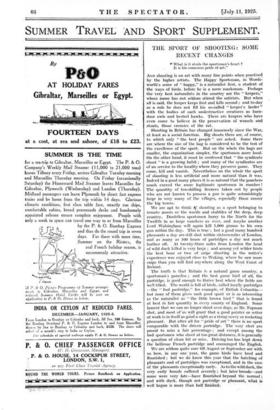111li SPORT OF SHOOTING: SOME RECENT CHANGES
44 What is it steels the sportsman's heart ? It is his conscious pride of art."
AND shooting is an art with many fine points when practised by the higher artists. The Happy Sportsman, in Words- worth's sense of " happy," is a naturalist first, a student of the ways of birds, before he is a mere marksman. Perhaps the very best naturalists in the country are the " keepers," whose name has not seldom stirred the satirists. But when all is said, the keeper keeps first and kills second ; and as a rule he does not fill his so-called " keeper's larder " with the bodies of such undestruetive creatures as barn- door owls and kestrel hawks. There are keepers who have even come to believe in the preservation of weasels and stoats, those enemies of the rat.
Shooting in Britain has changed immensely since the War, at least as a social function. Big, shoots there are, of course, to which only " the best people " are asked. Some there are _where the size of the bag is considered to be the test of the excellence of the sport. But on the whole the bags are smaller, the organization simpler, the sportsmen more local. On the other hand, it must be confessed that " the syndicate shoot " is a growing habit ; and many of the syndicates are of no service to the locality where they preserve game. They come, kill and vanish. Nevertheless on the whole the spoit of shooting is less artificial and more natural than it was. Indeed in a good many places it is so natural that the poachers much exceed the more legitimate sportsmen in number ! The quantity of ten-shilling licences taken out by people who are not known to possess a gun is quite astonishingly large in very many of the villages, especially those nearer the big towns.
We are apt to think 41 shooting as a sport belonging to remote moors or the woods and stubbles of the deep, deep country. Doubtless sportsmen hurry to the North for the Twelfth in as large numbers as ever, and maybe another Lord .Walsingham will again kill 1,000 grouse to his. own gun within the day. This is true ; but a good many hundred pheasants a day are still shot within sixteen miles of London, and as many as 100 brace of partridges a day not much further off. At twenty-three. miles from London the head of wild duck killed is very large ; and among yet wilder birds the best hour or two of snipe shooting in the writer's experience was enjoyed close to Woking, where he saw more snipe than you will find anywhere along the West _Coast of Ireland.
The truth is -that Britain is a natural game country, a spo'rtsman's paradise ; and the best game bird of all, the partridge, is good enough to thrive best where the fields are well tilled. The world is full of birds, called locally partridges —the " fool partridge," for example, of British Columbia-L but none of them gives such good sport 'Or .is so interesting to the. nattiralist as " the little brown bird " that is found at best in fait." quantity in every county of England. Soine lathent that we can no longer shoot over dogs, as Mr. Tupman shot, and most or us will grant that a good pointer or setter at work is in itself as gOod a sight as arising covey or rocketing pheasant. But after all for pride of art " there is no sport comparable with the driven partridge. the very elect are proud to miss a fair percentage ; and except among the bad sportsmen who shoot at too great distances; it is generally a question of clean hit or miss. Driving too has kept down the bellicose French partridge and encouraged the English. We are seldom quite sure till Angtist Or September are with us how, in any one year, the game birds have bred and flourished ; but we do know this year that the hatching of pheasants and of partridges was exceptional, and in the case of the pheasants exceptionally early. As to the wild duck, the very early broods suffered severely ; but later broods—and some were very late—have flourished beyond the normal ; and with duck, though not Partridge or pheasant,' What is well begun is more than half finiShed.


























































 Previous page
Previous page